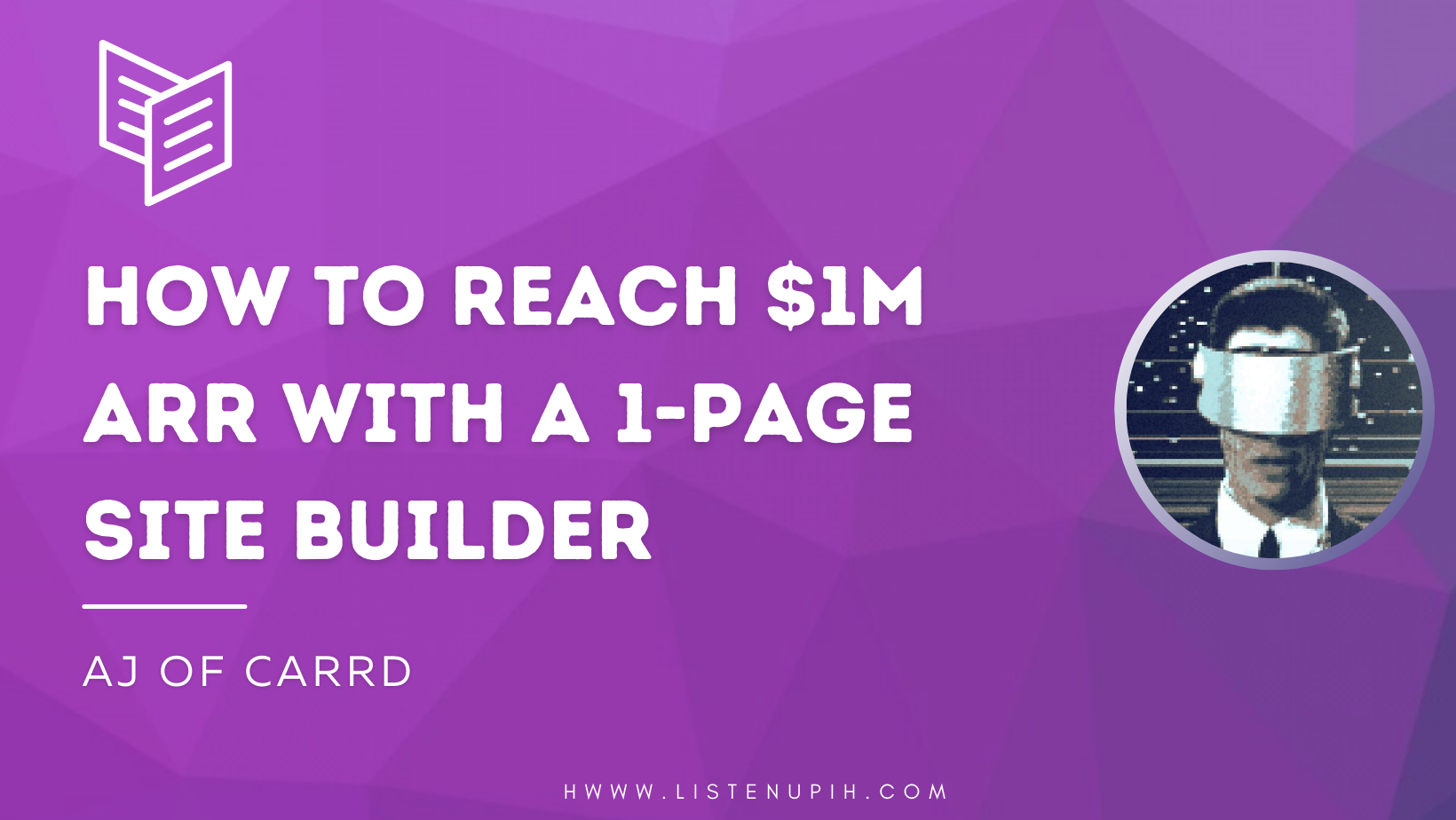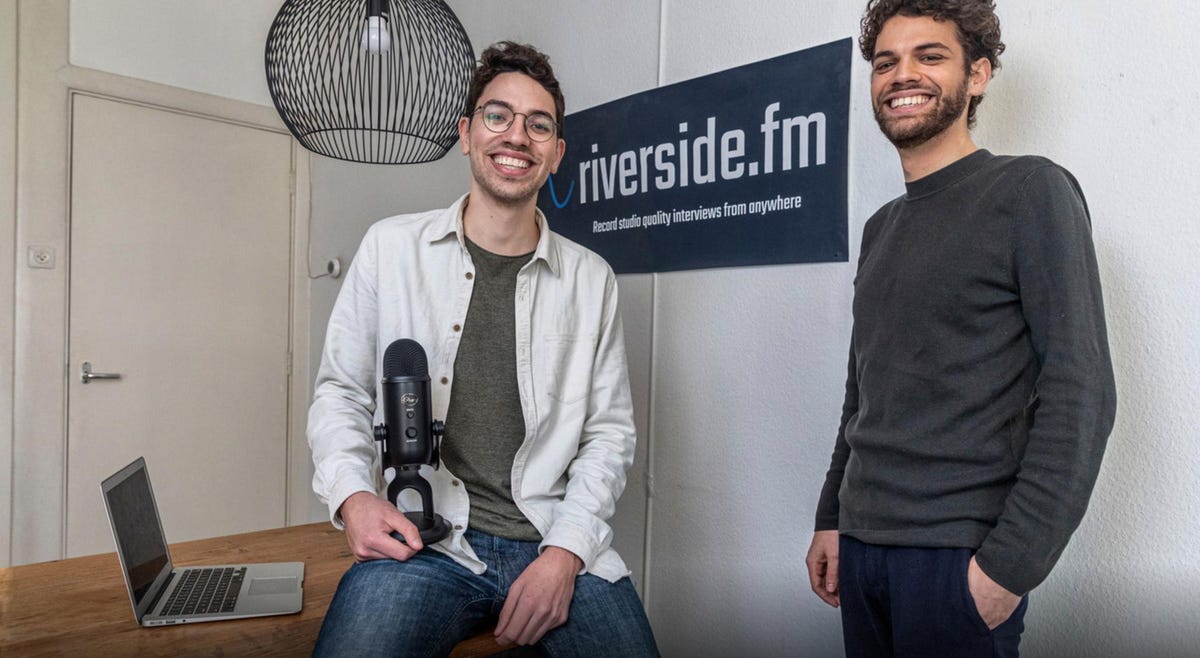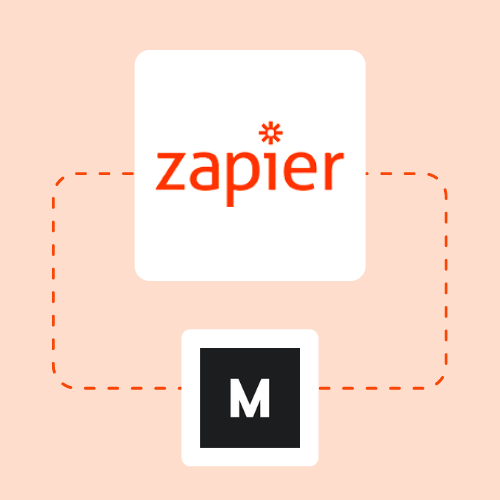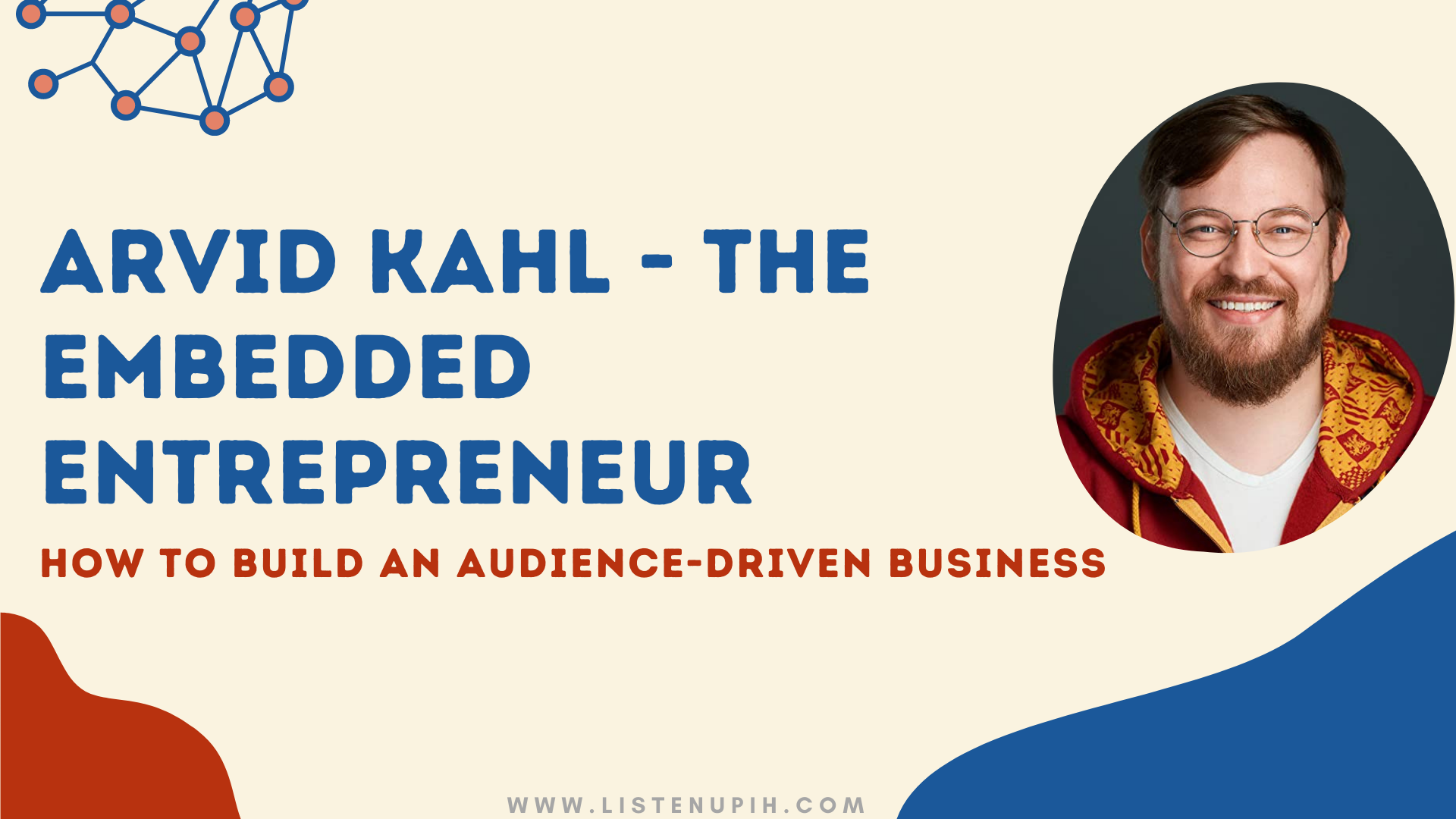21 Key Lessons from 21 Indie Hackers (Listen Up IH Wrapped)📈

This newsletter has been running for almost 9 months now.
I’ve researched and written about some of the most successful indie hackers throughout the year.
As 2021 ends, this is a good time to look back on some of the best profiles I could do and what we can learn from each story.
Here I’ve tried to pick the top 21 profiles and highlighted key lessons from their startup’s success story.
Hope this helps you find some interesting ideas, insights, and inspiration for your own journey.
(And to be on this list yourself in 2022💪)
Let’s go -
1. AJ of Carrd
- “Constraints are superpowers”
- Build an audience from multiple projects over time. AJ did that with html5up and pixelarity.
- Initial traction from Twitter and Product Hunt.
- Viral growth after Kim Kardashian’s Tweet.
Read more -

2. Jon Yongfook of Bannerbear
- Divide your time 50:50 between coding and marketing.
- The 12 startups challenge is a great way to find out your own passion, build the discipline to ship.
- “Niche Down” means niche down your target market. It doesn’t mean niche down the pain point you solve.
- Better documentation and blogs led to more conversions.
- Pivoted the product to ride on the NoCode movement.
Read more -

3. Pieter Levels of NomadList
- "Be less scared and just do more things!"
- You don't need a fancy tech stack for a profitable business.
- FB and Google serve the masses, Indie Hackers can serve the niches.
- Making money online is hard, being prolific gives you more shots at it. Pieter did the 12 startups challenge to grow an audience and multiple successful businesses.
Read more -

4. Sabba of Veed
- “Keep pushing, and make something people search for”
- A chip on your shoulder can fuel your success. Sabba was rejected from YC twice!
- Veed’s growth channels - Side projects, Content Marketing, SEO and YouTube SEO.
- You can come back from any situation, Sabba and Tim had no jobs and no revenue, but eventually could build a million dollar business.
Read more -

5. Jay Clouse of Freelancing School
- Take relentless action.
- Progress compounds, even if it’s slow initially.
- Expand the surface area of your luck, and good things will start to happen.
Read more -

6. Li Jin of SideHustleStack
- Start one level below your current skill level.
- Free up your energy and resources to actually gather feedback and gain some momentum. If you start at your peak level, you will stretch yourself too thin.
- Find your personal product-market fit. Find the market for your passion, if there isn’t one, then create one.
- SideeHustleStack got Viral growth through TikTok.
Read more -

7. Evan Britton of Famous Birthdays
- Focus maniacally on the customer.
- You will need a lot of passion and commitment to get through the initial years. It will take time, blood, sweat, and tears.
- Do one thing but do it well.
- Extensively used internal search to optimize the product.
Read more -

8. James Traf of Super
- Luck favors those who are in motion.
- You don’t need a business plan, you need some initiative.
- When you're going viral, make sure to capitalize on the virality.
- Traf’s iOS 13 icons went viral when tech YouTuber MKBHD featured them on his channel. And he made the best use of that virality.
Read more -

9. Bram Kanstein of NoCodeMVP
- Build the smallest version of your idea first.
- Making it small doesn't mean it's less valuable!
- If you deliver value to your users, they don’t care how good/bad your site looks.
- Bram’s project Startupstash has more than 21K upvotes on Product Hunt. He did that by continuously providing value to people on PH for a long time.
Read more -

10. Sam Parr of The Hustle
- Copywriting is the number one skill you need if you want to make money
- Business is like music - there are a handful of structures and best practices within them, follow and you won't fail.
- Launch something tomorrow, do it fast.
- Sam built a million dollar content business with The Hustle and recently sold it to Hubspot for an undisclosed amount.
Read more -

11. Sahil Lavingia of Gumroad
- “Enough is a decision, not an amount.”
- Align selfishness with selflessness, figure out what you can do creates value for the world.
- Build stuff, start small and figure out what you want to build.
Read more -

12. Dru Riley of Trends.vc
- Build relationships and store goodwill
- Take your time before launching on Product Hunt, don’t be in a hurry
- Twitter threads are a great distribution channel.
- Find something that you can stick with for a while.
Read more -

13. Jordan O’Connor of Closet Tools
- Learn transferrable skills that you can apply in multiple businesses.
- Transferrable skills like web development, SEO, Copywriting.
- Learn them deeply and you can never go wrong.
- Jordan built up closet tools as a niche product, a chrome extension for Poshmark, and took it to $40K+ MRR.
- Initial validation from Reddit, subsequent growth from SEO.
Read more -

14. Ryan Hoover of Product Hunt
- There will always be an opportunity to create a community around something.
- Tech is a way to express yourself, the same way music is a way to express yourself.
- Ryan Hoover was passionate about products, so he started a newsletter around new products back in 2013.
- Eventually, it got acquired by AngelList and today it’s one of the most popular sites in the startup ecosystem.
Read more -

15. Nathan Barry of ConvertKit
- Build in Public for a mission, not for the eyeballs
- Compounding takes time, give it the years it needs.
- Be the guide not the hero in your customer's journey
- "It takes way longer than you think, and it's worth it if you keep going.”
Read more -

16. Andrey Azimov of Sheet2Site
- Start with a simple 1 button app.
- Build multiple projects in 1 year and see what sticks - do a hardcore year like the 12 startups challenge.
- Built his audience through his hardcore year projects, collected emails, launched on PH. Was PH maker of the year.
- Sheet2Site was a site builder, it was doing okay for the initial couple of years, but went viral during Covid.
- Eventually, Andrey had an exit after 3 years.
Read more -

17. Kyle Gawley of Gravity
- No employees, no investors, no location.
- Find problems that are painful and customers would pay a fee for it.
- Save time or money or both for your users.
- Kyle became an ex-pat indie hacker after he came very close to death working on his venture-backed startup.
Read more -

18. Nadav Keyson of Riverside
- Find your unique edge.
- You can have a network moat or a tech moat or growth as a moat. Riverside had tech and growth as moats in their journey.
- Build a product with word-of-mouth marketing built-in, like a Hallmark greeting card. A podcasting app is the ideal example of it.
- Riverside primarily grows through word of mouth. They got a boost during the pandemic and even a shoutout from Hillary Clinton herself.
Read more -

19. Samy Dindane of Hypefury
- Your MVP doesn’t have to be very polished, it doesn’t need to take long to build. It just needs users.
- There are no crowded markets, find niches within niches.
- Paying users are the best validation you need.
- User interviews are the best way to get the early product right.
- Indie hackers is a good place to find a co-founder. That’s where Samy and Yannick met.
Read more -

20. Ben Tossell of Makerpad
- Figure out the path of least resistance, and start building.
- You are the product of your environment, Ben was surrounded by new tech products all day, eventually became a NoCode Maker.
- High quality content sites and communities have great value.
- Often just repositioning an existing product can work well.
- Makerpad was acquired by Zapier from a Tweet!
Read more -

21. Arvid Kahl The Embedded Entrepreneur
- Trust the concept of involuntary reciprocity. Give enough for free to people, help them, make their life easier without asking anything in return.
- 3 pillars of building an audience are - engagement, empowerment, and valuable content.
- Coding is the 4th step in building a business. The first 3 are figuring out who to serve, what to serve them with, and how YOU can actually serve them.
- The idea first approach to building a startup can be reversed, the audience first approach is way more sustainable and feasible.
Read more -

Have thoughts?
Let's chat, I tweeted about this post earlier -
I've spent more than 300 hours this year on Listen Up IH.
— Ayush 🙏 (@ayushtweetshere) December 30, 2021
I've profiled 1 Indie Hacker every week for the last 9 months.
My 1600+ subscribers have loved it🤗
But I myself have benefited the most from working on this project.
21 Key Lessons I Learned from 21 Indie Hackers 👇
Thank you for reading🙏
Hope you find these stories helpful and inspiring in your own journey.
Every week, I share the most actionable insights and inspiring tips from successful Indie Hackers FOR aspiring Indie Hackers
Ideas + Insights + Inspiration for building profitable internet businesses💪
Sign up to Listen Up! IH and join 1600+ spirited Indie Hackers who read this newsletter every week.
Thanks to Seth King for editing all posts.
Cheers,


